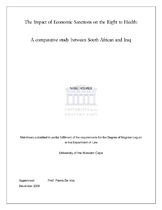| dc.description.abstract | Under the United Nations Charter, the Security Council may decide what measures, not involving the use of armed force, are to be employed to give effect to its decisions and may call upon member States to apply such measures in order to maintain or restore international peace and security.2 One of the measures that can be decided on is sanctions. Sanctions have, to a large extent, been imposed to defend human rights. Economic sanctions were commonly believed to be a mechanism that was a humane alternative to war. During the last decade, the Security Council has applied economic sanctions in several cases that, in turn, have drawn the attention of different United Nations human rights bodies and mechanisms to their possible impact on the enjoyment of human rights.3 Fundamentally, any economic sanctions programme's main objective is to induce dysfunction in the trade and financial systems of the target State. | en_US |

